Key takeaways:
- Literary agent rejections are often not personal; they may reflect market needs and subjective preferences.
- Understanding common reasons for rejections, such as lack of marketability and weak character development, helps writers improve their manuscripts.
- Reframing rejections as growth opportunities and seeking constructive feedback can enhance writing skills and perseverance.
- Finding the right literary agent involves identifying those who align with your story’s themes and values, rather than focusing solely on fame.
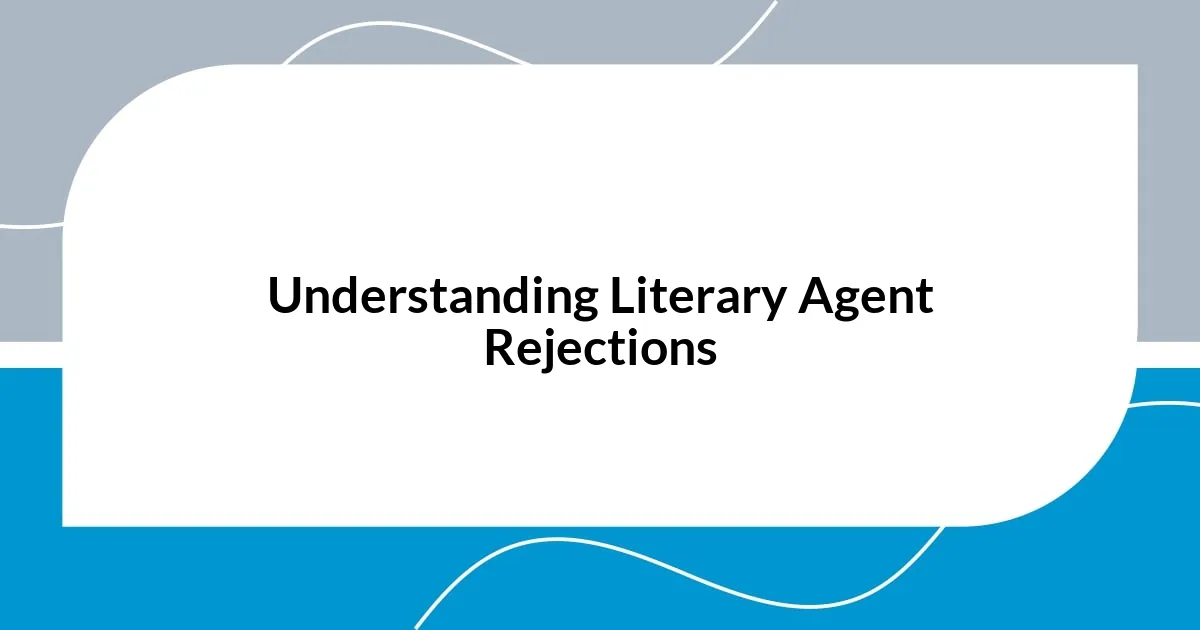
Understanding Literary Agent Rejections
Understanding literary agent rejections can feel like a personal blow, especially after putting your heart and soul into a manuscript. I still remember receiving my first rejection email; it felt like someone had crushed a part of my dream. But over time, I’ve learned that these rejections are often not personal. Agents deal with countless submissions, and sometimes it’s simply about market fit.
When I dissected my rejections, I realized many were form letters, devoid of personal feedback. I began to ask myself: What if this feedback is more about the agent’s needs at the moment than the quality of my work? That pivot in perspective allowed me to see rejections as a necessary part of the journey rather than the end of my writing aspirations.
Sometimes, I got reevaluated notes from agents—encouragement tucked in alongside the polite declines. Those moments reminded me that the literary world is incredibly subjective. Have you ever felt that spark of hope when someone sees potential in your work, even if it’s not the right fit for them? Understanding literary agent rejections means embracing the complexity of rejection while still holding onto the belief that your writing deserves to be heard.
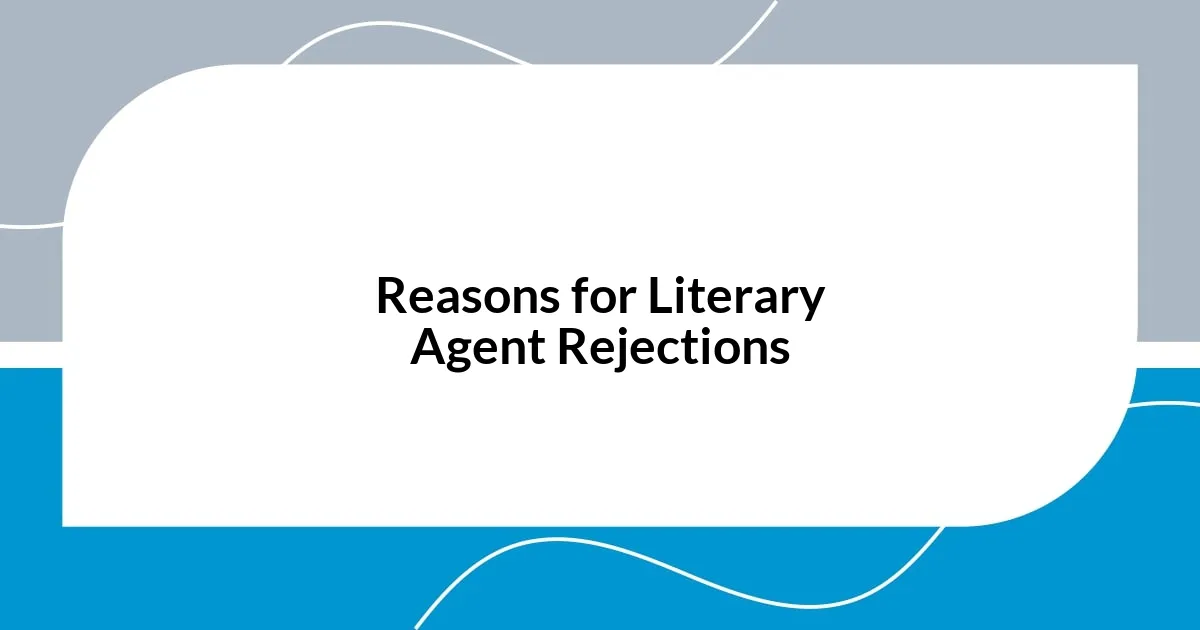
Reasons for Literary Agent Rejections
When I reflect on the reasons for literary agent rejections, I find that the feedback often highlights common pitfalls in manuscripts. Many times, agents are looking for a distinct voice or originality. If a manuscript feels derivative, it might not resonate with them, despite the quality of writing.
Here’s a list of typical reasons I came across in my journey:
- Lack of Marketability: The story doesn’t align with current industry trends.
- Weak Character Development: Characters may feel flat or unrelatable.
- Pacing Issues: The story drags in sections, losing the reader’s interest.
- Genre Misalignment: The manuscript doesn’t fit the agent’s specific genre interests.
- Unclear Theme or Message: It might be difficult to pinpoint the core message or theme.
- Overly Complex Structure: I once wrote a story with multiple timelines which confused agents rather than intrigued them.
Recognizing these factors allowed me to reassess my work and understand that rejections weren’t always about my ability as a writer, but about aligning with what each agent needs at a given time. Embracing this helped alleviate some of that initial sting.
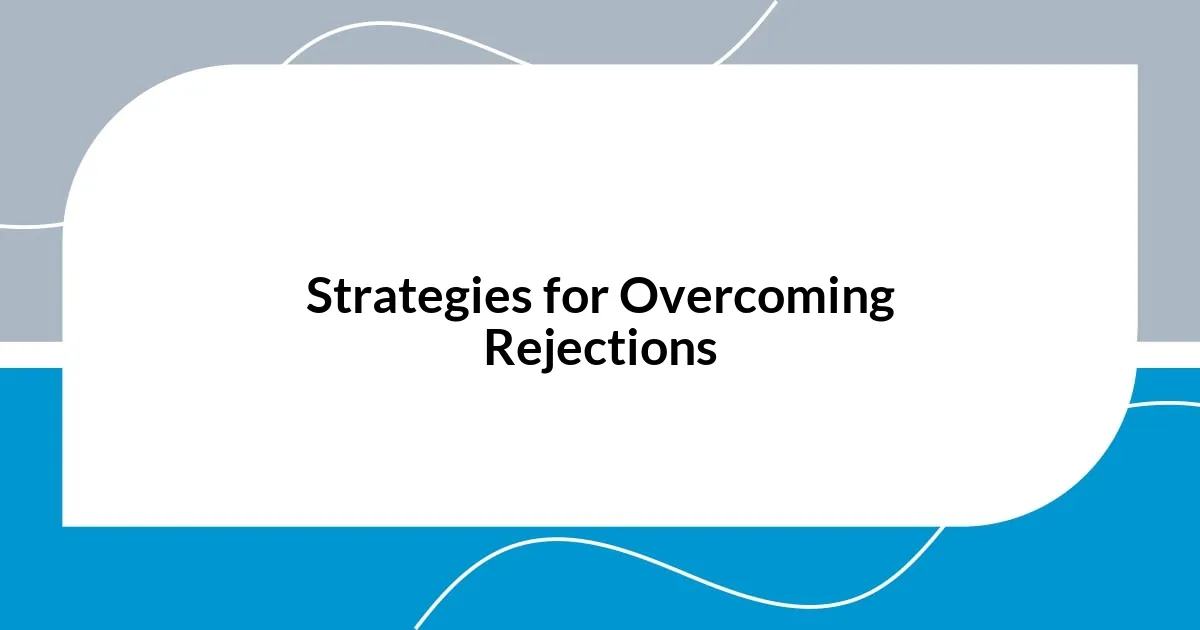
Strategies for Overcoming Rejections
When faced with rejections, one effective strategy I embraced was to reframe my mindset. Instead of viewing each “no” as a failure, I started to see them as stepping stones toward improvement. For instance, after receiving a rejection, I would ask myself how I could use that moment to refine my manuscript or enhance my writing craftsmanship. This shift in perspective encouraged me to evolve rather than wallow, keeping my passion for writing alive during challenging times.
One practical step I found helpful was to seek out feedback. After my early rejections, I began sharing my work with trusted writing friends. Their insights opened my eyes to aspects I hadn’t considered, such as character motivations and plot pacing. I vividly remember one friend pointing out a plot hole that, at first, felt disheartening, but ultimately strengthened my story. Do you have a trusted critique partner? Their constructive criticism can be invaluable in transforming a rejection into a learning opportunity.
Finally, I learned the power of perseverance. Each rejection nudged me to keep writing, strive for improvement, and submit to more agents. I recall a time when I received a particularly disheartening batch of rejections. It would have been easy to give up, but I pressed on and submitted my revised manuscript to a few more agents. To my surprise, one of them saw potential and requested a full manuscript. That moment reminded me that persistence can lead to unexpected triumphs.
| Strategy | Description |
|---|---|
| Reframe Mindset | View rejections as opportunities to learn and grow rather than personal failures. |
| Seek Feedback | Share your work with trusted peers for constructive criticism. |
| Practice Perseverance | Continue submitting your work and revising based on feedback received, even after setbacks. |
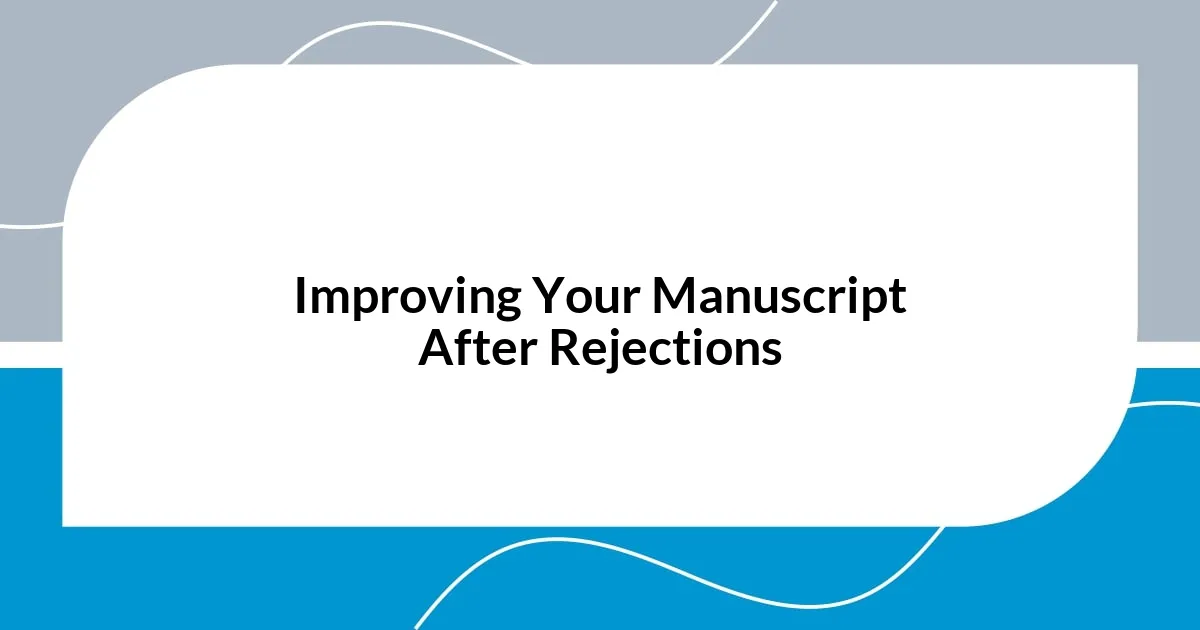
Improving Your Manuscript After Rejections
One of the most profound lessons I learned after facing multiple rejections was the importance of taking a step back and analyzing my manuscript with fresh eyes. I vividly remember revisiting my writing after a particularly tough week. It was painful to confront the flaws, but I had a lightbulb moment realizing that my protagonist was lacking depth. Asking myself, “What motivates this character beyond their immediate goal?” pushed me to deepen their backstory, ultimately enriching the narrative.
Seeking external perspectives also became crucial for my revision process. I distinctly recall a writing workshop where I shared a chapter I believed was my strongest. The feedback surprised me: fellow writers felt the stakes were too low, which I hadn’t seen before I shared. That experience made me realize how much I needed others to challenge my perceptions. More than just seeking feedback—I began actively inviting critique, knowing that honest input often sheds light on the blind spots in my work. Have you considered who in your circle could provide that candid support?
Moreover, I found that embracing the revision process transformed rejection from a painful reminder of inadequacy to a constructive exercise in growth. Every time an agent passed on my manuscript, rather than feeling defeated, I channeled that energy into making specific changes. I remember one rejection that mentioned my story’s pacing dragged in the middle. Instead of sulking, I took that feedback to heart and rewrote several key scenes that not only accelerated the plot but also made the emotional arcs more engaging. Have you thought about how you could turn feedback into a catalyst for transformation? It’s an exhilarating process when you see your hard work evolve into something better, revitalizing both your manuscript and your motivation.

Crafting a Strong Query Letter
Crafting a strong query letter is an art form in itself. When I first started, I underestimated its power. I recall spending hours polishing my manuscript but writing my query letter in a rush, only to encounter rejections that I later understood were due to a lackluster pitch. I soon realized that the query letter was my first chance to hook an agent, much like the opening of a novel. What story are you telling in your letter? It should be just as captivating as the one in your manuscript.
Specificity became my guiding principle when crafting my query. Instead of generic statements about my story, I pinpointed what made my plot unique. I remember being thrilled to highlight a twist in my narrative that I believed set it apart from others in my genre. This attention to detail not only excited readers but also helped me feel more connected to my work. Have you considered what unique elements your story brings to the table? Those details really matter in making your query stand out.
Finally, I learned the importance of keeping my query concise yet informative. After a few rounds of rejections, I discovered that brevity is not just about cutting words; it’s about clarity. I found myself honing in on essential elements—the character’s goal, the stakes, and the conflict—without losing voice or tone. One agent once responded positively to my letter and commented on how much they appreciated its clarity. It reinforced the idea that clarity not only showcases professionalism but also enhances the agent’s understanding of my story. Have you taken a moment to review your query with fresh eyes? You might be surprised at how clarity can transform it into an irresistible pitch.
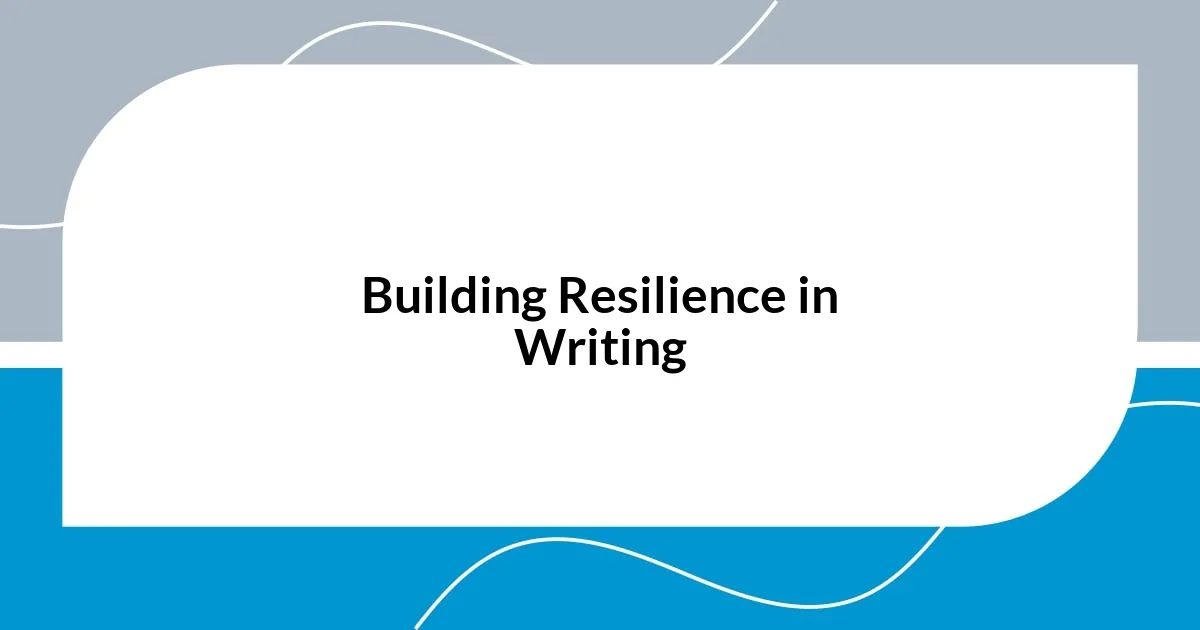
Building Resilience in Writing
Building resilience in writing is essential for navigating the landscape of literary agent rejections. I remember one rejection that left me feeling particularly disheartened, as if my dreams were abruptly snatched away. Instead of wallowing in self-pity, I chose to journal about what I felt, transforming that moment of pain into a tool for growth. Have you ever tried channeling your feelings into writing? It’s amazing how processing those emotions can clarify your path forward.
On another occasion, I participated in a writers’ retreat designed to foster resilience through community support. Sharing my rejections with others brought solace, inspiring me to realize that rejection is merely a stepping stone on the path to success. Connecting with fellow writers not only reminded me that I wasn’t alone but also fueled my determination to keep pushing forward. It’s profound to think that our struggles, when shared, create a powerful bond. Are there groups or communities you could tap into for support?
Over time, I recognized that each rejection was not just a closure but an opportunity for refinement. I remember the sting of a particularly cold rejection email, but instead of feeling defeated, I took a hard look at my goals. This reflective practice led me to clarify my vision and infuse my voice into my writing with newfound vigor. I realized that resilience isn’t just about how many times we stand back up; it’s about how we evolve with every setback. How do you plan to turn your own rejection experiences into stepping stones for your growth? Embrace the journey; it’s where the real magic happens.
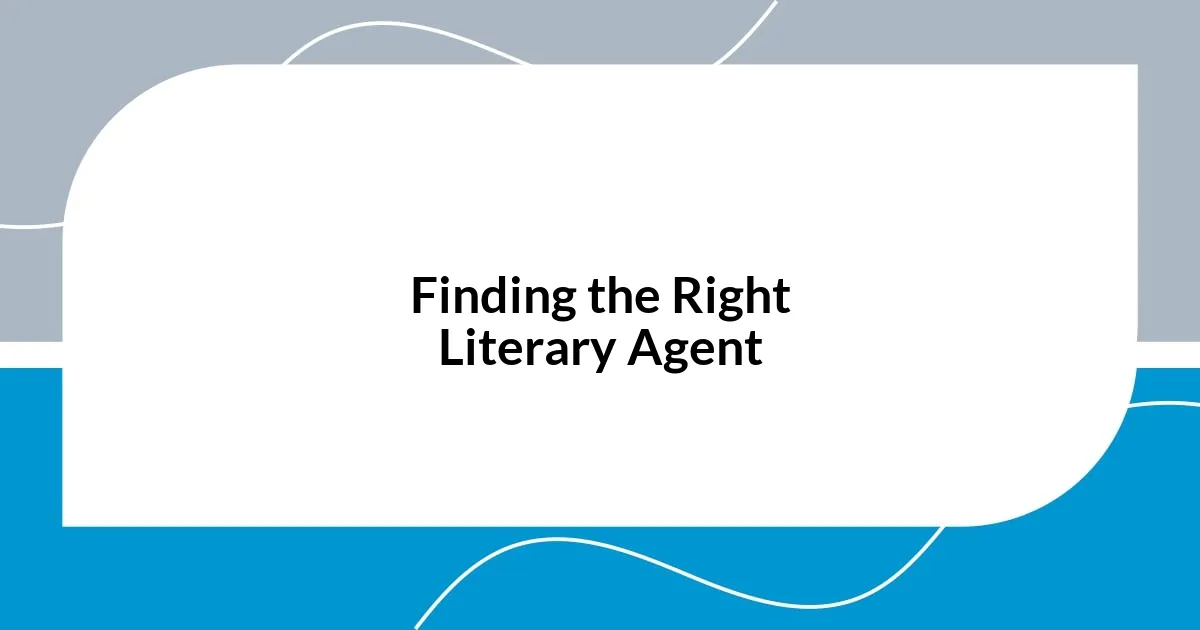
Finding the Right Literary Agent
Finding the right literary agent can feel like searching for a needle in a haystack, but it’s a journey worth taking. When I first ventured into this realm, I armed myself with a list of agents from online databases, but I quickly realized that not all agents are created equal. I remember the moment I discovered an agent who not only represented my genre but also had a keen interest in the themes I explored. It made all the difference, as I felt a deeper connection to my pitch because I knew they would genuinely appreciate my work. Have you done your homework to find agents who share your vision?
A pivotal moment in my journey was attending a local writing conference where I could hear agents speak directly about what they seek in manuscripts. Listening to their perspectives opened my eyes to the nuances of the industry. One agent candidly shared how they loved character-driven stories, and at that moment, I felt as if she was speaking directly to me. It sparked a realization: aligning my work with the right agent is not just about following trends; it’s about understanding the heart of my own story. How often do you consider the unique aspects of your narrative that could resonate with specific agents?
As I refined my approach to finding the perfect agent, I learned to embrace the concept of fit over fame. My initial excitement for high-profile agents faded when I realized a passionate advocate for my work was far more valuable than a big name. A personal connection can sometimes create a ripple effect of support and enthusiasm. One of my best experiences was when an agent—I initially thought was out of my league—responded with genuine excitement about my story. It taught me that authenticity and alignment in vision can lead to wonderful partnerships. What qualities do you believe are essential in a literary agent for your journey?